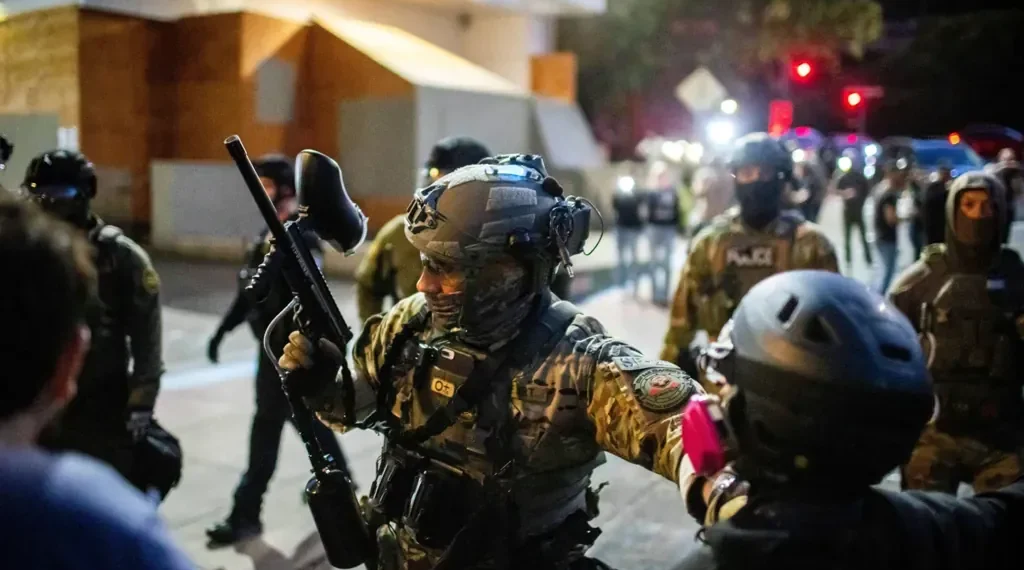Federal Court Halts Trump Administration’s Oregon National Guard Deployment
Published: October 6, 2025, 21:45 EDT
A federal judge has temporarily stopped the Trump administration from deploying National Guard troops to Oregon, issuing an emergency order that blocks any transfer of military units from other states into Portland. The ruling follows a legal dispute that escalated after the administration attempted to circumvent an earlier court decision restricting the use of Oregon’s own National Guard.
Federal Judge Halts Federal Deployment Plans
U.S. District Judge Karin Immergut granted a temporary restraining order late Sunday after Oregon and California filed a joint request to halt the deployment. Immergut, who was appointed during Donald Trump’s first term, expressed concern that the administration’s actions appeared to defy her earlier ruling issued less than 24 hours before.
During the emergency telephone hearing, Immergut pressed government attorneys to explain how sending federalized troops from California and Texas did not violate her previous order.
“How could bringing in federalized National Guard from California not be in direct contravention to the temporary restraining order I issued yesterday?” she asked, according to court transcripts. “Aren’t defendants simply circumventing my order?”
The White House has not yet commented on the ruling. The restraining order remains in effect for 14 days, pending a follow-up hearing scheduled for October 17. A subsequent hearing on October 29 will determine whether the temporary order should be extended into a preliminary injunction.
Oregon’s Legal Challenge and Protest Context
The legal dispute centers on efforts by Oregon officials to block federalized National Guard troops from entering Portland, where small nightly protests have continued outside a federal immigration facility since January. While most gatherings have been peaceful and limited in size, tensions rose in late September when federal agents used tear gas to disperse demonstrators.
President Trump has repeatedly described Portland as “war ravaged” and a “war zone,” citing unrest and property damage. However, local officials argue that his statements exaggerate the scale of the protests and rely on outdated imagery from 2020, when large-scale demonstrations following the Black Lives Matter movement gripped the city for several months.
City authorities note that the protest area currently covers a single block, far from downtown Portland, and that recent efforts by the city’s new leadership have reduced crime and homelessness in the urban core.
Interstate Troop Transfers Raise Legal Questions
The administration’s attempt to mobilize troops from other states quickly drew criticism from state officials. Roughly 200 members of the California National Guard who had been stationed near Los Angeles were reassigned to Portland over the weekend, according to a Pentagon spokesperson.
Alan Gronewold, commander of Oregon’s National Guard, confirmed in court documents that about 100 California troops arrived in Portland early Sunday, with another 100 following later that evening. A Defense Department memo, signed by Defense Secretary Pete Hegseth, also authorized up to 400 Texas National Guard personnel for potential deployment to Oregon, Illinois, and other states.
Scott Kennedy, an attorney representing Oregon, told the court he learned of the Texas mobilization less than half an hour before the emergency hearing. “It feels a little bit like we’re playing a game of rhetorical whack-a-mole here,” he said during arguments.
Lawyers for the federal government countered that neither Oregon nor California had legal standing to block the deployments, asserting that federal law allows the President to activate National Guard forces under certain conditions to protect federal property.
Reactions from State and Local Leaders
Oregon Governor Tina Kotek praised the judge’s ruling, calling it “a critical victory for state sovereignty and constitutional order.”
“President Trump’s actions are an effort to occupy and incite cities and states that don’t share his politics,” Kotek said in a statement. “Oregon will continue to defend its rights at every turn.”
California Attorney General Rob Bonta described the administration’s decision to deploy one state’s National Guard to another as “unprecedented and unlawful.”
“This President is determined to take as much power as the courts will allow him,” Bonta said. “This ruling is an important step toward reaffirming limits on executive authority.”
Portland Mayor Keith Wilson also expressed concern about the federal response, accusing federal agents of using unnecessary force against demonstrators. “This is an aggressive approach that risks inflaming tensions,” Wilson said, adding that he has referred the matter to the Department of Justice’s Civil Rights Division.
Next Steps in the Legal Battle
The temporary restraining order issued by Judge Immergut will remain in effect through mid-October unless extended. The court is expected to hear additional arguments on October 29 to decide whether to impose a longer-term injunction preventing the Trump administration from deploying National Guard units in Oregon.
Meanwhile, the U.S. Army Northern Command has reportedly advised California’s Military Department that approximately 300 Guard personnel may remain federalized through the end of January, suggesting the administration plans to continue asserting federal authority over state forces.
The case highlights growing tensions between state governments and the federal executive branch over control of the National Guard — a force traditionally under state command unless formally federalized during emergencies or under the Insurrection Act.
For now, Oregon officials have vowed to maintain their challenge in court and resist any renewed federal deployment, while the White House faces increasing scrutiny over the legal limits of presidential power in domestic security operations.
This article was rewritten by JournosNews.com based on verified reporting from trusted sources. The content has been independently reviewed, fact-checked, and edited for accuracy, neutrality, tone, and global readability in accordance with Google News and AdSense standards.
All opinions, quotes, or statements from contributors, experts, or sourced organizations do not necessarily reflect the views of JournosNews.com. JournosNews.com maintains full editorial independence from any external funders, sponsors, or organizations.
Stay informed with JournosNews.com — your trusted source for verified global reporting and in-depth analysis. Follow us on Google News, BlueSky, and X for real-time updates.














